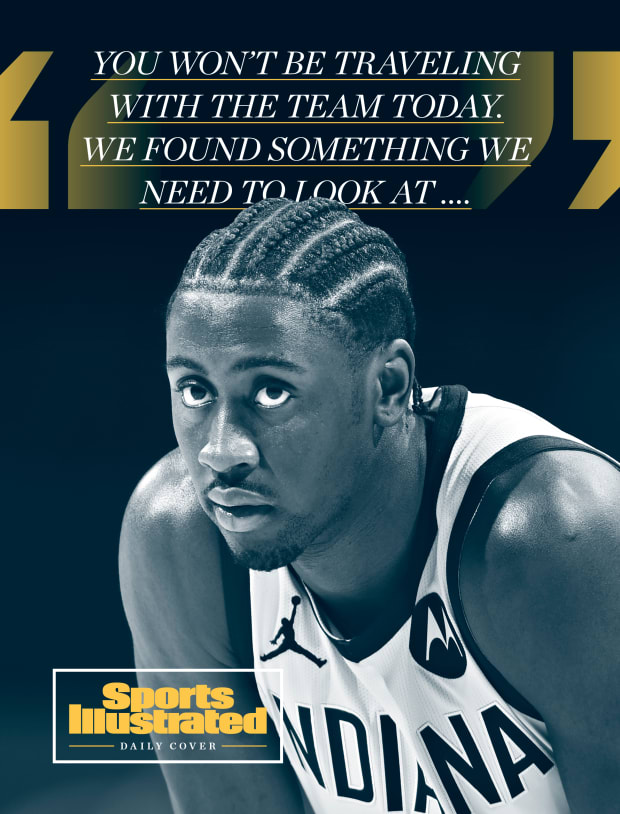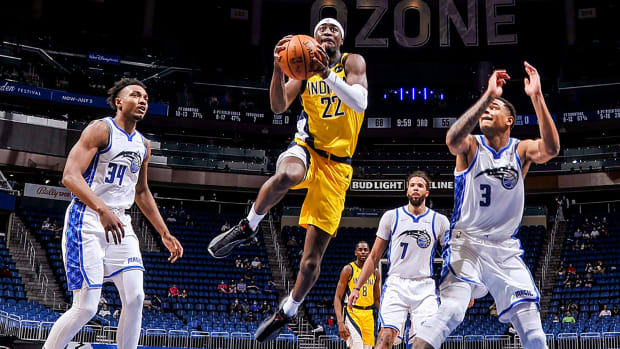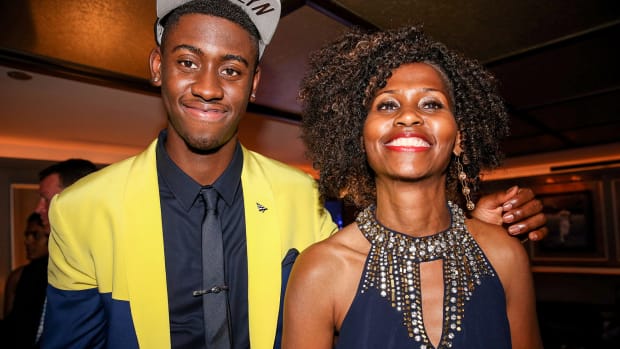When the Pacers acquired the guard, his physical revealed a cancerous tumor. Now, after having his kidney removed, he's back on the floor.
Caris LeVert remembers thinking he had been waiting a lot longer than usual for the results of a routine medical exam.
It was Friday, Jan. 15, and LeVert had just been traded to the Pacers in a landscape-altering move that sent former MVP James Harden to Brooklyn. The night before, LeVert packed a couple of suitcases and caught a late-night flight with his brother, Darryl, from New York to Indianapolis. LeVert only had to complete his physical before he could join his teammates in Los Angeles, where they were in the middle of a road trip.
The Pacers included a lower back MRI in their physical, something many teams don't do. LeVert thought nothing of the procedure and had been in the hospital biding his time for about three hours when he finally asked a nurse if he was good to go. After being informed the doctors were still looking over his results, he decided he would go back to his hotel so he could wait more comfortably.
Not long after he walked into his room, he got a call from the Pacers’ team physician, whom he hadn’t even met during the exam.
“I know you don’t know me,” the doctor said. “But you won’t be traveling with the team today. We found something we need to look at.”
“What’s going on?,” a confused LeVert asked. There was a long pause.
“We found a tumor on your left kidney.”

LeVert had been dealing with trade rumors since November, when reports started to trickle out that Harden might be looking to engineer his exit from Houston, with Brooklyn one of his top destinations. LeVert was an attractive trade chip. Despite some injury issues, he flashed potential as a multi-level scorer in his time with the Nets. In back-to-back postseasons in 2019 and 2020, he averaged more than 20 points per game while shooting more than 40% from three.
In the Orlando bubble, LeVert took on a lead role in the absence of Kevin Durant and Kyrie Irving. Though Brooklyn was swept by the Raptors, LeVert attracted attention with his No. 1 scorer mentality. His coach with the Pacers, Nate Bjorkgren, was then an assistant for Toronto and tasked with slowing him down.
“He was a handful,” Bjorkgren recalls, now cheerfully. “We threw so many different defenses at him in that series. We forced him left, we forced him right, we trapped him, we played box and one. You name it, we tried it. And even when we did that he still had big games.”
LeVert did his best to ignore the trade rumors in the offseason. When family members, such as his mother Kim, asked if he could really get moved after showing so much promise in Brooklyn, he calmly explained being an asset was simply the nature of the business.
In mid-January, the temperature around a Harden trade started to heat up, particularly after the Rockets announced he would stay away from the team until his situation could be resolved. On Jan. 13, LeVert and the Nets were scheduled to take on the crosstown rival Knicks. Before he could get down for his pregame nap, LeVert received a call from his aunt Karen, who asked if he was about to get traded. Still not knowing any answers, LeVert went to sleep. He awoke to a flurry of phone calls and texts, and knew he had been moved.
“Darryl!” LeVert shouted to his younger brother downstairs. “It looks like we’re going to Houston!”
Original reports had LeVert going to the Rockets in a three-team trade also involving the Cavaliers. In a surprising development, the Pacers—whose name had been absent from most rumors—glommed on as a fourth member in the deal, acquiring LeVert in exchange for impending free agent Victor Oladipo. Brooklyn GM Sean Marks called LeVert personally to explain the situation. Immediately, Bjorkgren’s mind started racing about the possibilities.
“The first thing that came to my head was there were a number of ways he could be great for our team,” Bjorkgren says. “He’ll push the ball up the floor when he has to, he’ll play off the ball when he has to, he knows how to make reads coming off screens, when he gets blitzed he can pass out of the trap. We knew we were getting a really good player.”
After informing his brother, the next person LeVert wanted to speak about the trade with was his mom. Kim was in the middle of shopping when she got the call, and quickly dashed into her car so she could listen to her son more clearly.
“Believe it or not, I said congratulations,” LeVert’s mother says of her first reaction to the news.
“Mom!” Caris exclaimed back, in the universal tone of a son frustrated with his mother for being slightly too positive. “You’re not supposed to say that!”
Neither knew it at the time, but his mother was right to treat the news as something to celebrate. Because the trade may have saved her son’s life.

The moment he received the phone call he had a tumor on his left kidney, LeVert froze. The doctor continued trying to explain the situation over the phone—that more tests had to be run, that it wasn’t clear if the mass was cancerous—but LeVert couldn’t hear anything else after the word tumor. He said he would call back and hung up. After five minutes of pacing around his room, he finally phoned his doctor, wanting to be sure he had actually heard the right words.
“I was like, So you said I have what?” LeVert says.
The doctor confirmed LeVert had a tumor, but they wouldn’t know more about the mass until further testing. He was asked to come back to the hospital the following Monday for a comprehensive evaluation. LeVert was in shock, and quickly had to relay the news to his brother, who was staying with him in Indianapolis. Darryl was relaxing in his room with the door shut when he got a cryptic text from Caris saying he wouldn’t be making the trip to Los Angeles for the game against the Clippers on Jan. 17. Caris asked Darryl to come out of his room so they could chat.
“When he told me, I didn’t see anything in his face as far as him being scared,” Darryl remembers. “He didn’t cry. He just told me what it was. And then it was a silent moment.”
It wasn’t the first time Caris had to deliver bad news to his family. On April 4, 2010, Caris and Darryl found their father unresponsive on the floor of their family room. Caris, then 15 years old, had to call his mother, who was out of town, to tell her that her husband had died of heart failure.
“He’s the strongest person I know,” Darryl says. “We’ve been through so much in our life, and he’s yet to back down from anything.”
When Caris called his mother to tell her about the growth on his kidney, she dropped the laptop she was holding in her hand during the conversation. Kim, who lost her mother to cancer, immediately told her son she would come to Indianapolis from Maryland.
Caris still had two days to endure before he could find out more about the tumor. And not only was he dealing with his medical situation, but he was doing so in a new city, with a team whose doctors and front office he still had no real personal relationships with. He had so many questions and did not know whom to ask. He did his best to clear his mind, working out and shooting hoops with Darryl over the weekend. The LeVert brothers are only 11 months apart and have been playing basketball with each other their whole lives, back to when they would play one-on-one at Sycamore Creek Park in Pickerington, Ohio. (Darryl has beaten Caris in one-on-one only once, and it happened when Darryl was 13 and hit a prayer of a game-winner. Caris was not happy about losing on a lucky shot.) Their workouts would last hours to help pass the time until the next round of tests.
Meanwhile, speculation was growing around LeVert. Harden couldn’t make his Nets debut until every player involved in the trade had completed their physical. LeVert was being bombarded on social media with people asking if he skipped his physical or failed it. On Jan. 16, the Pacers put out a statement regarding the discovery of the mass on his left kidney.
And though he did his best not to obsess over the unknown while he waited for the further evaluation, LeVert played out every possible scenario in his head.
“My emotions went everywhere,” he says. “If it’s spread everywhere, then my whole life is going to be different. If it’s not cancerous, then I can play again. At that point, whatever they told me, I was going to try to be at peace with the situation. Because at that moment, there’s really nothing I can do other than be positive.”
Finally, on Monday, doctors told LeVert there was good news and bad news. The latter was that he had renal cell carcinoma of his left kidney—meaning the tumor was cancerous. The good news was that the tumor was detected early, before it had spread anywhere else in his body. Due to that early detection, LeVert was expected to make a full recovery.
“No telling if they would have found it three months later if it would have spread,” LeVert says. “It’s beautiful they found it when they did.”
After his second exam, Kim and and her mother-in-law joined her sons in Indiana. The night before Caris’s surgery, they all prayed together for a speedy recovery.
Before going under the knife, LeVert wasn’t sure if only the tumor would be removed, or if the size of the growth would require his entire kidney to be taken out. His surgeon, Dr. Jason Sprunger, assured him he would live a perfectly healthy life either way, because people can still function normally even with only one kidney. Sprunger couldn’t promise LeVert he would play again this season, because there wasn’t a robust history of NBA players trying to return from such a situation. But the doctors left the door open for LeVert when they said a return could be possible if he felt up to it.
On Jan. 25, LeVert underwent successful surgery. The kidney was removed. He awoke with his mother waiting for him. And he immediately set his sights on getting back on the court.

LeVert spent his first week after his surgery in the hospital, watching Pacers’ games on TV so he could start to become familiar with his teammates. The next week he was at home, but his spirits weren’t especially high. Kim tried many things to cheer her son up. She attempted to braid his hair but realized she wasn’t exactly skilled enough to do so. She cooked for him even as his appetite dwindled. They walked to the pharmacy across the street to introduce Caris to some light physical activity. They also played catch in Caris’s hotel room, even though Kim raised her sports-loving boys with a “no ball in the house” rule.
The games of catch perked Caris up. Soon he started demanding his mom place her passes more accurately, and the distraction helped take his mind off the side effects of his surgery. Finally, in early February, he was ready to get back on a basketball court. And at that exact moment he realized how difficult his journey forward would be.
“The first time I picked a basketball up after surgery, I wasn’t that excited,” LeVert admits. “I just wanted to lay down. I’ve dislocated my ankle, I’ve broken my foot three times—this pain was so much harder to get through than any of my other injuries. I had a lot of nausea. I wasn’t eating for two weeks. I lost a lot of weight. And the pain medicine was feeding the nausea. It was definitely tough.”
Still, LeVert’s determination to regain a sense of normalcy outweighed his pain. On Feb. 10, he joined his teammates in Brooklyn, where he was honored by his former club as he watched the Pacers from the bench, participating in an on-court workout before the game. Slowly but surely, LeVert ramped up his workouts, going from solo drills to non-contact workouts, to one-on-one work, two-on-two work, and so forth until he could participate in full-contact practices. In early March, an Athletic report indicated LeVert was expected to return after the All-Star break.
LeVert started in his first game for Indiana on March 13. He scored 13 points and picked up seven rebounds and two assists in 27 minutes of action in a win over the Suns. Because his return happened quickly and on the road, his family couldn’t be there, but they celebrated in their own ways. Kim watched in her home, inviting some family and friends to join her. Darryl watched back in Indiana, and immediately after the game he ribbed his brother about his shot selection.
Bjorkgren says the team was energized by having LeVert on the floor. As for Kim, her emotions during her son’s return ranged from fear to excitement.
“I was happy, but at the same time I was wondering, Did he come back too fast?” Kim says. “Having my family around me made it much better. And I was able to see him do what he loves to do. This is such a blessing.”

LeVert is now a month into his return, and he still has his bad days. There are times he doesn’t want to move, or his stomach is in pain, or he can’t shake off a bout of lethargy. The doctors told him these lingering effects were to be expected, especially because they didn’t expect him to be back on the court this soon.
“I just keep it in my mind that a month and a half ago I couldn’t do anything,” he says. “Now I can do something, so I can push through that.”
Bjorkgren has grown used to playing LeVert normal minutes in his rotation, and he has responded by averaging 17.1 points, 4.5 rebounds and 4.3 assists in 32.8 minutes per game. Indiana has gone 9–7 in his 16 starts, and the Pacers have a chance to tighten their hold on a play-in spot tonight against the Clippers, when LeVert makes his first national TV appearance since his surgery. Opponents have sometimes approached LeVert during games and told him how happy they were to see him playing, and though he appreciates the respect around the league, LeVert avoids thinking of his diagnosis in the middle of a game because of his competitive nature.
Off the court, LeVert fully embraces his experience with renal cell carcinoma. He’s becoming an ambassador for the American Cancer Society, encouraging people to get screened early so that, like him, they can recover fully.
“Especially when it comes to African Americans,” Levert says, “Because in our communities, we don’t do that. I think it’ll be huge for them to see me as someone who got it early and got screened early. Maybe it could save one of their lives as well.”
Kim, who raised two God-fearing sons who overcame the untimely death of their father with grace, who unknowingly congratulated her son the day of the trade that may have saved his life, believes what happened to Caris is only a small part of a larger journey.
“I feel in my heart of hearts, the Lord has something super duper special for him to do beyond the court,” she says. “On the court, I think he’s destined to be that player you always talk about. But at the end of the day, I know that God is not finished with him yet. With all my heart and soul, I believe that.”
• Where Is the Opposition to the Tokyo Games?
• What Happened to Sports Jeopardy?

0 Comments:
Post a Comment